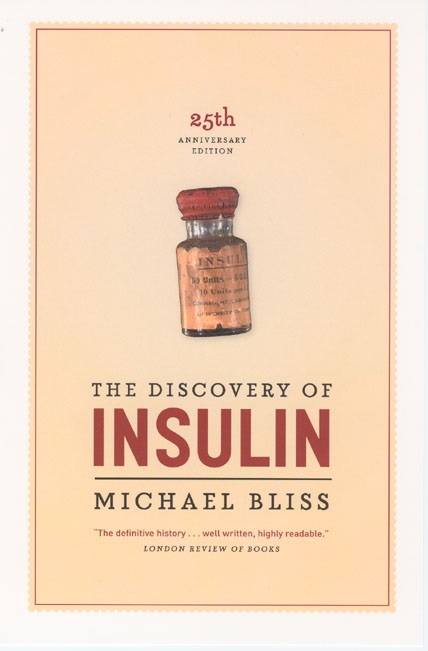The Discovery of Insulin

On this day in 1921, researchers at the University of Toronto announced the discovery of the hormone insulin. In the nearly nine decades since, insulin has transformed diabetes from a death sentence to a manageable condition.
But the discovery of this miracle drug was hardly free from controversy. With various researchers staking claims for recognition and prize money, the bizarre clash of scientific personalities threatened to overshadow one of the most significant and contentious medical events of modern times. In the brilliant, definitive book The Discovery of Insulin, award-winning historian Michael Bliss sets the record straight.
When F. G. Banting and J. J. R. Macleod won the 1923 Nobel Prize for discovering and isolating insulin, Banting immediately announced that he was dividing his share of the prize with his young associate, C. H. Best. Macleod divided his share with a fourth member of the team, J. B. Collip. For the next sixty years medical opinion was intensely divided over the allotment of credit for the discovery of insulin. In resolving this controversy, Bliss also offers a wealth of new detail on such subjects as the treatment of diabetes before insulin and the life-and-death struggle to manufacture insulin. This now-classic study unearths a wealth of material, ranging from scientists’ unpublished memoirs to the confidential appraisals of insulin by members of the Nobel Committee.
Check the twenty-fifth anniversary edition of the book the New Republic praised as an “excellent account of the insulin story [and] a rare dissection of the anatomy of scientific discovery [that] serves as a model of how rigorous historical method can correct the myths and legends sometimes perpetrated in the scientific literature.” And next Spring, Bliss will return to our list with The Making of Modern Medicine: Turning Points in the Treatment of Disease, a compact and compelling history that renders medical history as a fascinating story of dedication and discovery.